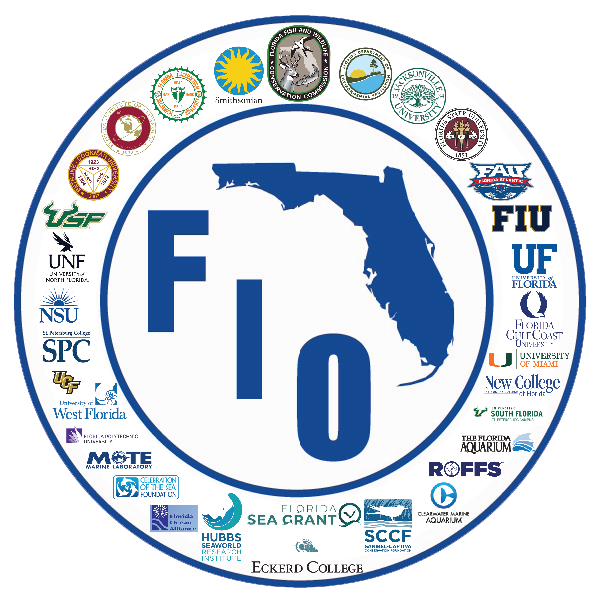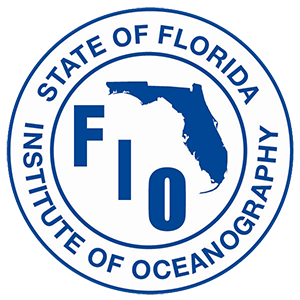
FIO’s Consortium consists of 32 institutions and membership is broken into 3 categories (Full, Associate, and Affiliate).
Eckerd College is Located on Florida’s Gulf Coast on 188 acres of waterfront property in St. Petersburg. It is a private, coeducational college of liberal arts and sciences known distinctively for Marine Science, Environmental Studies, International Relations and Global Affairs, Creative Writing, Organizational Studies, International Education, and Service Learning. Eckerd’s 1,840 residential students from 43 states and 35 countries choose among 38 majors leading to a Bachelor of Arts or Bachelor of Science degree.
Florida Agricultural and Mechanical University (FAMU), is an 1890 land-grant and doctoral/research institution dedicated to the advancement of knowledge, resolution of complex issues and the empowerment of citizens and communities. FAMU can provide a wide breadth of expertise and capabilities, as well as access to key strategic partnerships related to efforts associated with the Deepwater Horizon oil spill.
Florida Atlantic University (FAU) Harbor Branch Oceanographic Institute is a world-renowned research facility. Its marine scientists, engineers, educators and other professionals work together in pursuit of its mission, expressed as Ocean Science for a Better World.
The Florida Department of Environmental Protection (FDEP) is responsible for environmental management and stewardship and is one of the more diverse agencies in state government, protecting our air, water, and land. The Department is divided into three primary areas: Regulatory Programs, Land and Recreation and Planning and Management.
The Fish and Wildlife Research Institute (FWRI) is the research arm of the Florida Fish and Wildlife Conservation Commission (FWC). FWRI conducts statewide research programs to obtain the data and information that managers of fish, wildlife, and ecosystem resources need to sustain Florida’s natural resources.
Florida Gulf Coast University (FGCU) has faculty with expertise in water quality, analytical chemistry, hydrodynamics, marine geochemistry, physiology, invertebrate zoology, plankton ecology, oyster-reef ecology, ecotoxicology and impact assessment. We are actively conducting research in the estuarine and near-coastal zones of southwest Florida from Charlotte Harbor south to Ten Thousand Islands and the southern tip of Florida.
Founded at the dawn of the Space Race in 1958, Florida Institute of Technology (FIT) is a doctoral research university and the only independent, technological university in the Southeast.
Florida International University (FIU) is designated as a top-tier research institution, FIU emphasizes research as a major component in the university’s mission. Focus areas include marine chemistry and water quality, ecotoxicology, marine ecology, economic impacts, and energy policy. FIU is well-poised to monitor water quality and ecosystem dynamics in south Florida in response to the spill as well as the long-term impacts of the spill on marine organisms.
Florida Polytechnic University (FPU) was founded on April 20, 2012, when legislation was signed that immediately created Florida Poly as a new institution in the State University System of Florida.
Florida Sea Grant uses academic research, education and extension to create a sustainable coastal economy and environment.
They are a partnership between the Florida Board of Education, the National Oceanic and Atmospheric Administration (NOAA) and Florida’s citizens, industries and governments. Florida Sea Grant leads programs related to seafood safety, boating and waterway management, coastal conservation law, aquaculture and fisheries management.
Florida State University (FSU) brings to bear a broad spectrum of expertise and capabilities of direct relevance to the Deepwater Horizon oil spill. Focus areas extend from marine ecology, fisheries, ocean modeling, winds, remote sensing and meteorology to economics, tourism and risk assessment and remediation. FSU has unique technical capabilities including high resolution petroleomics capabilities at the National High Magnetic Field Laboratory and high performance computing.
Mote Marine Laboratory is an independent, nonprofit marine science organization founded in 1955 with five Florida campuses from Sarasota to the Florida Keys. Mote scientists conduct research in the oceans surrounding all seven continents.
New College of Florida (NCF) is an undergraduate public honors college with a primary focus on liberal arts undergraduate education. Faculty scholarship addresses a number of topics relevant to the Deepwater Horizon oil disaster and its potential impacts on the nearshore marine and coastal ecosystems of southwest Florida.
Nova Southeastern University (NSU) and its Halmos College of Natural Sciences and Oceanography and Shepard Broad College of Law bring expertise in a number of key areas to the Deepwater Horizon oil spill.
The Smithsonian Marine Station (SMS) is a research center specializing in marine biodiversity and ecosystems of south Florida. The Station has been located in the Fort Pierce area since the early 1970’s and is currently at 701 Seaway Drive in Fort Pierce. A public exhibit is located close by in the St. Lucie County Marine Center at 420 Seaway Drive.
The University of Central Florida (UCF) is currently the second largest university in the country and is a major research institution experienced at partnering with local, state, and federal agencies, nongovernmental organizations, and industry to solve environmental and water resources problems.
As Florida’s Sea Grant and Land Grant University, the University of Florida (UF) is uniquely positioned to provide expertise and resources for dealing with the Deepwater Horizon oil spill in the Gulf of Mexico.
The University of Miami (UM) and the Rosenstiel School of Marine & Atmospheric Science (RSMAS) offer broad-based expertise in a variety of disciplines that have direct relevance to the Deepwater Horizon oil spill in the Gulf of Mexico.
The University of North Florida (UNF) is a comprehensive university located in Jacksonville, Florida, and is part of the State University System (SUS). UNF brings a wide spectrum of niche expertise and capabilities of direct relevance to the Deepwater Horizon oil spill.
The University of South Florida (USF), along with its local federal, state, and private-sector partners, has been uniquely positioned to become the premier research institution understanding the oceanography of Florida’s coastal ocean required to predict the movement of the oil emanating from the Deepwater Horizon well and the potential impacts that oil may impact on the marine environment.
The University of West Florida (UWF) is situated near the westernmost border of Florida. Faculty, staff, and students are active in marine ecology, fisheries, economics, tourism and oil bioremediation.
Bethune-Cookman University, a Historically Black College and University (HBCU), has an Integrated Environmental Science Department focused on large-scale coastal and watershed issues and challenges. B-CU also is leading the Halifax River Urban Watershed Sustainability Initiative and is a member of the NOAA Center for Coastal and Marine Ecosystems (CCME).
Clearwater Marine Aquarium (CMA) believes in preserving our environment while inspiring the human spirit through leadership in the rescue, rehabilitation, and release of marine life, environmental education, research and conservation.
Scientific Research includes Sea Turtle Nesting and monitoring. CMA released more than 60,000 sea turtle hatchlings into the Gulf of Mexico since 2005.
FOA, a statewide non-profit organization, is dedicated to bringing together the private marine sector, nonprofit research organizations, and academia. The Florida Ocean Alliance serves as a clearinghouse for information on key Florida coastal and ocean issues and recently developed a Strategic Policy Plan for Florida’s Oceans and Coasts: Securing Florida’s Blue Economy to protect living marine resources, the environment, promote marine economic activity and enhance public outreach.
Hubbs-SeaWorld Research Institute (HSWRI) is a public, non-profit charity dedicated to providing effective solutions to conflicts that arise between human activity and the natural world. Hubbs-SeaWorld scientists apply sophisticated technologies to seek the solutions that protect and conserve marine animals while benefiting humans and their reliance on marine resources.
Jacksonville University (JU) opened the Marine Science Research Institute (MSRI) in 2010 as a Gold certified Leadership in Energy and Environmental Design (LEED) facility as part of a planned complex focusing on the St. Johns River. The goal of the university in establishing the new institute was to provide a premier biological and environmental research and education facility.
Sanibel-Captiva Conservation Foundation (SCCF) conserves coastal habitats and aquatic resources in Sanibel, Captiva and surrounding watershed. Their Marine Laboratory focuses on seagrass, mangroves, algal blooms, fish populations and shellfish restoration. RECON (River, Estuary and Coastal Observing Network) provides real-time data on a 90-maile area. SCCF was founded in 1967 and manages 1,800 acres total on Sanibel and Captiva Islands.
Professors at St. Petersburg College (SPC) conduct research on local marine environments. A vital part of SPC research is the involvement of undergraduate students. FIO provides opportunities for collaboration with the college.
The Florida Aquarium is a 501(c)(3) nonprofit institution whose mission is to entertain, educate and inspire stewardship about our natural environment. The Florida Aquarium is home to more than 20,000 aquatic plants and animals representing species from Florida and around the world.
University of South Florida St. Petersburg (USFSP) Department of Biological Sciences’ curriculum includes animal behavior, biophysics, botany, cell biology, conservation biology, freshwater and terrestrial ecology, genetics, marine sciences, microbiology, and restoration ecology. The department supports pre-professional and health-science career objectives, and prepares students for graduate studies in biology.
The Celebration of the Sea Foundation works to engage, educate, and inspire people around the world to protect the ocean and the world’s natural resources. A specific focus of all our initiatives is to develop resilient communities and promote STREAM (Science, Technology, Resiliency, Engineering, Arts & Math) education and career paths.
ROFFS is a scientific consulting company based in Miami and West Melbourne and is involved with fisheries oceanography, environmental science, and satellite remote sensing.
